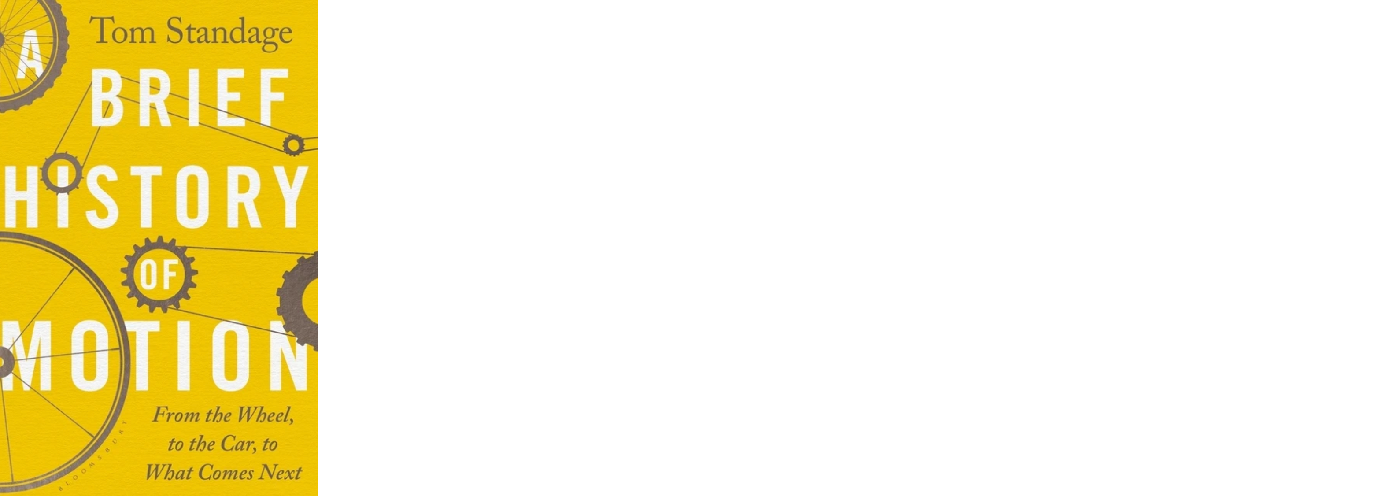Book of the week: A Brief History of Motion by Tom Standage
Standage’s history of wheeled transport is richly rewarding

A free daily email with the biggest news stories of the day – and the best features from TheWeek.com
You are now subscribed
Your newsletter sign-up was successful
Tom Standage is “one of our best writers of non-fiction”, said Howard Schneider in The Wall Street Journal. His “niche” is the history of technology – but always with one eye on the future. When he finds the right subject, as he did in his 2013 book Writing on the Wall, about the “roots and repercussions of digital communication”, the results are scintillating.
His latest work – a history of wheeled transport – may not be quite his finest, but it is still richly rewarding. He starts at the beginning, with the advent of the wheel (probably in Eastern Europe in around 3500BC), and then traces its astonishing impact on human history.
Key milestones include the emergence of the chariot, near the Black Sea in around 2000BC, which revolutionised warfare, and of steel-spring horse-drawn carriages (in Kocs in Hungary, hence “coach”) in the 15th century. Inevitably, the story becomes busier as it approaches the present: the early 19th century saw the birth of the steam carriage and the steam train, and then of course came the car – the most transformational vehicle of all, and “the crux” of the book.
The Week
Escape your echo chamber. Get the facts behind the news, plus analysis from multiple perspectives.

Sign up for The Week's Free Newsletters
From our morning news briefing to a weekly Good News Newsletter, get the best of The Week delivered directly to your inbox.
From our morning news briefing to a weekly Good News Newsletter, get the best of The Week delivered directly to your inbox.
Ironically, the car’s great appeal in the early days was as a means of reducing “pollution and congestion”, said James McConnachie in The Sunday Times. City centres in the late 19th century were crowded, noisy and filthy. By the 1890s, 300,000 horses were living in London, each producing 10kg of dung a day. The stuff “was piled so high that streets became impassable”.
Cars solved this problem at a stroke. Intriguingly, many of the earliest ones were electric. In the 1890s, an electric taxi service briefly flourished in US cities, and in 1897 the bestselling car in America – the Columbia Motor Carriage – was powered by a battery.
Electric cars lost out to their petrol-powered counterparts because they had many of the problems people still complain about today, said Simon Winchester in The New York Times: they weren’t much good for long journeys; charging was often a problem.
The “automotive age” that followed was indelibly associated with the internal combustion engine – and Standage documents it with “masterly clarity”.
A free daily email with the biggest news stories of the day – and the best features from TheWeek.com
In the final chapter, he considers the future of the car. It’s a pity in a way, because the world he depicts – of self-driving cars, “Ubers everywhere”, drone deliveries, electronic highways – is so dreary. Still, for “fogies like me” who “prefer to recall the lasting charms of the wheeled age”, this “eminently readable” book contains a great deal to fascinate.
Bloomsbury 272pp £20; The Week Bookshop £15.99

The Week Bookshop
To order this title or any other book in print, visit theweekbookshop.co.uk, or speak to a bookseller on 020-3176 3835. Opening times: Monday to Saturday 9am-5.30pm and Sunday 10am-4pm.
-
 Why are election experts taking Trump’s midterm threats seriously?
Why are election experts taking Trump’s midterm threats seriously?IN THE SPOTLIGHT As the president muses about polling place deployments and a centralized electoral system aimed at one-party control, lawmakers are taking this administration at its word
-
 ‘Restaurateurs have become millionaires’
‘Restaurateurs have become millionaires’Instant Opinion Opinion, comment and editorials of the day
-
 Earth is rapidly approaching a ‘hothouse’ trajectory of warming
Earth is rapidly approaching a ‘hothouse’ trajectory of warmingThe explainer It may become impossible to fix
-
 Kia EV4: a ‘terrifically comfy’ electric car
Kia EV4: a ‘terrifically comfy’ electric carThe Week Recommends The family-friendly vehicle has ‘plush seats’ and generous space
-
 Bonfire of the Murdochs: an ‘utterly gripping’ book
Bonfire of the Murdochs: an ‘utterly gripping’ bookThe Week Recommends Gabriel Sherman examines Rupert Murdoch’s ‘war of succession’ over his media empire
-
 Gwen John: Strange Beauties – a ‘superb’ retrospective
Gwen John: Strange Beauties – a ‘superb’ retrospectiveThe Week Recommends ‘Daunting’ show at the National Museum Cardiff plunges viewers into the Welsh artist’s ‘spiritual, austere existence’
-
 Bad Bunny’s Super Bowl: A win for unity
Bad Bunny’s Super Bowl: A win for unityFeature The global superstar's halftime show was a celebration for everyone to enjoy
-
 Book reviews: ‘Bonfire of the Murdochs’ and ‘The Typewriter and the Guillotine’
Book reviews: ‘Bonfire of the Murdochs’ and ‘The Typewriter and the Guillotine’Feature New insights into the Murdoch family’s turmoil and a renowned journalist’s time in pre-World War II Paris
-
 6 exquisite homes with vast acreage
6 exquisite homes with vast acreageFeature Featuring an off-the-grid contemporary home in New Mexico and lakefront farmhouse in Massachusetts
-
 Film reviews: ‘Wuthering Heights,’ ‘Good Luck, Have Fun, Don’t Die,’ and ‘Sirat’
Film reviews: ‘Wuthering Heights,’ ‘Good Luck, Have Fun, Don’t Die,’ and ‘Sirat’Feature An inconvenient love torments a would-be couple, a gonzo time traveler seeks to save humanity from AI, and a father’s desperate search goes deeply sideways
-
 A thrilling foodie city in northern Japan
A thrilling foodie city in northern JapanThe Week Recommends The food scene here is ‘unspoilt’ and ‘fun’